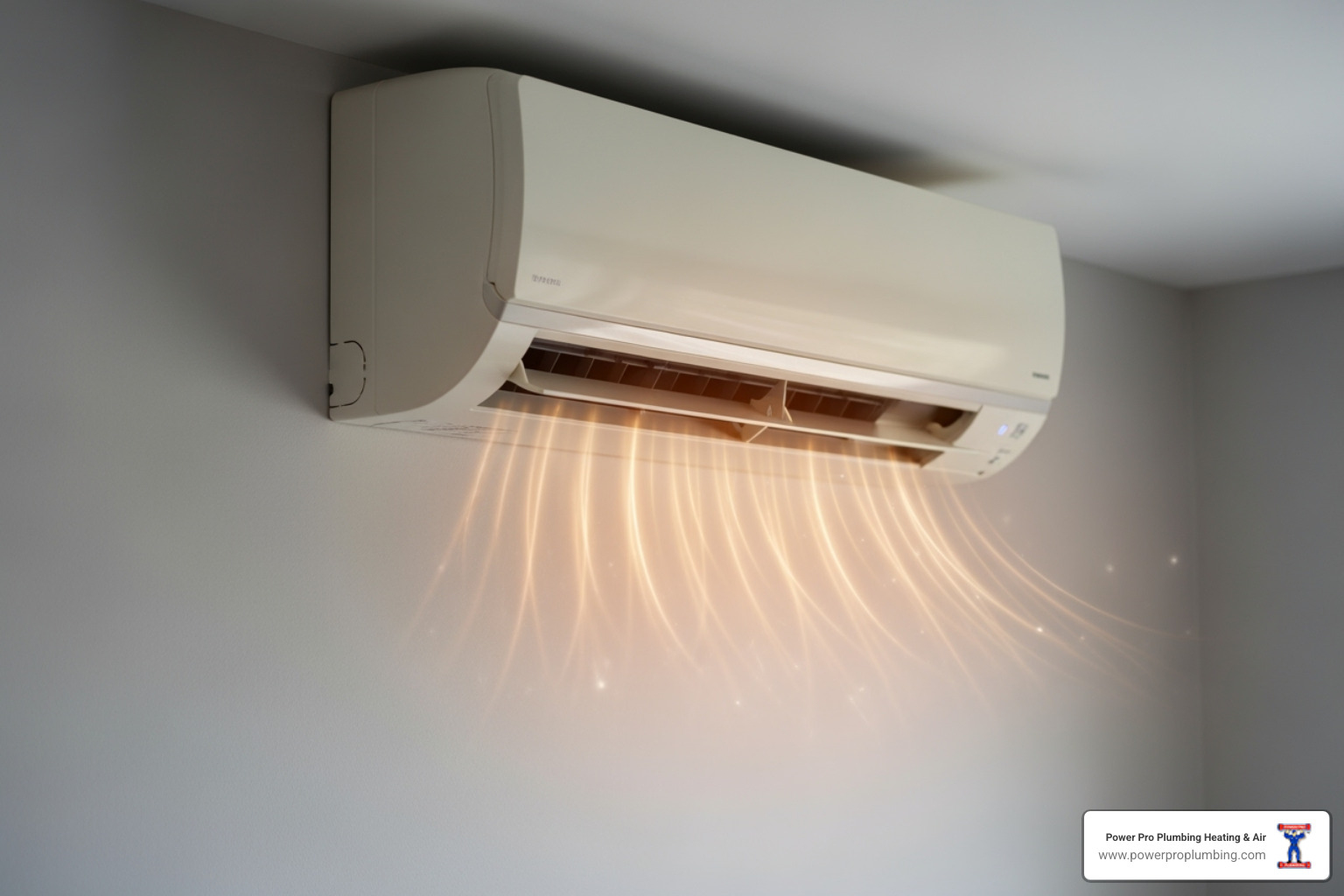
When Cold Air Becomes a Summer Memory
When you turn on your air conditioner during a scorching Los Angeles heat wave and feel warm air, it's a frustrating sign that your system needs attention. An AC blowing hot air can stem from simple fixes, like a wrong thermostat setting, or point to more serious problems requiring professional help. The good news is that many causes are straightforward to diagnose.
Quick Answer: Common Causes of AC Blowing Hot Air
- Thermostat set incorrectly - Check if it's on "cool" mode and fan is set to "auto"
- Dirty air filter - Restricts airflow and forces warm air through vents
- Refrigerant leak - Low refrigerant prevents proper cooling
- Frozen evaporator coils - Ice buildup blocks heat absorption
- Tripped circuit breaker - Outdoor unit loses power while indoor fan continues
- Faulty compressor - The heart of your AC stops working properly
If you're looking for reliable AC repair throughout Los Angeles, or need immediate service from certified professionals, understanding the cause is the first step to getting comfortable again.
I'm Daniel Rodriguez, a second-generation tradesman with a C20 HVAC license. I've diagnosed countless cases of AC blowing hot air throughout Southern California and know that ignoring these problems can lead to bigger issues. This guide will help you identify what's wrong and what to do next.
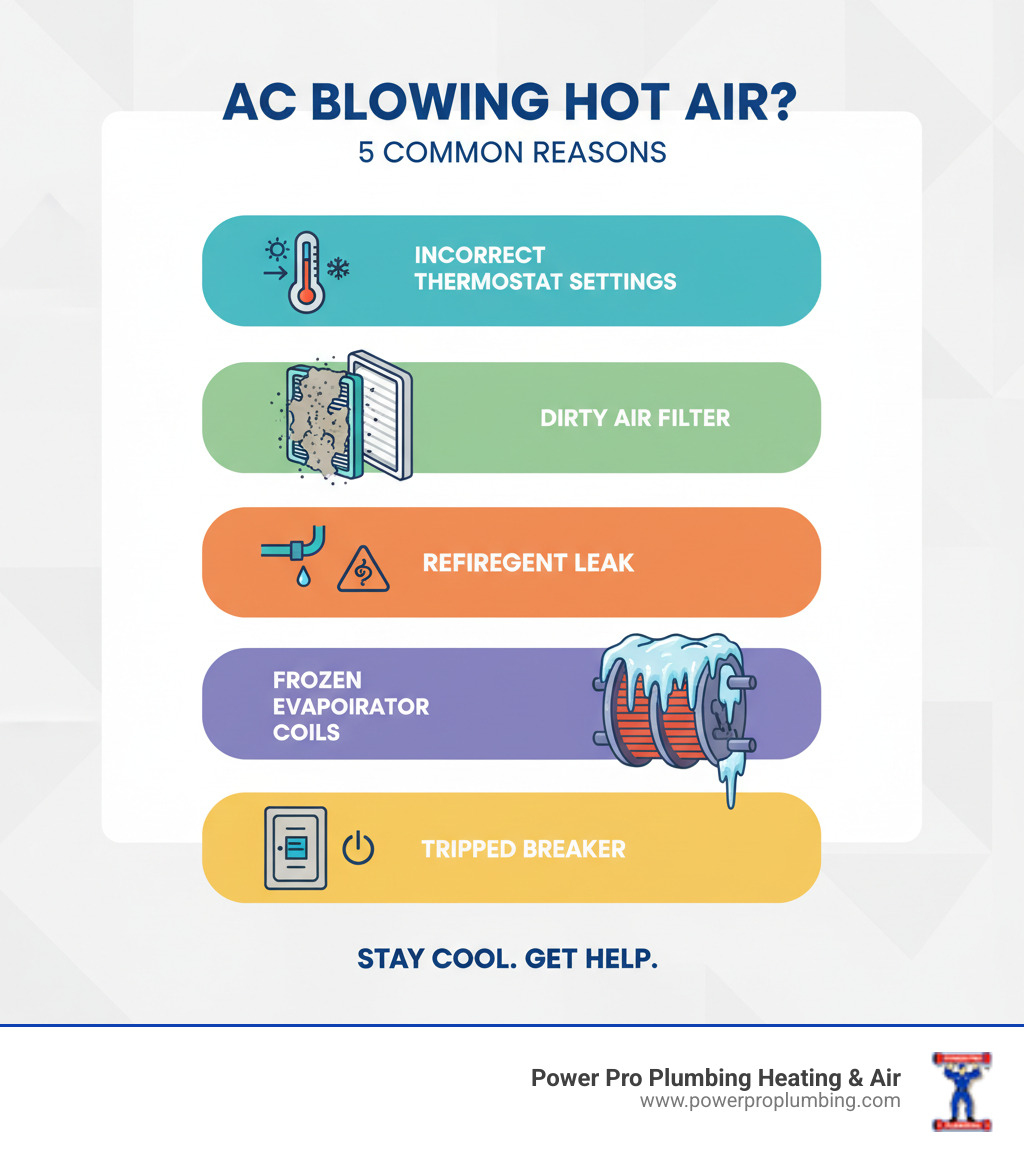
First Response: Simple Checks You Can Do Right Now
Before calling a technician, a few simple checks can often solve the problem of an AC blowing hot air. These quick inspections require no special tools and could save you time and money.
The Thermostat: Your System's Brain
Your thermostat is the control center for your AC, so it's the first place to look. An incorrect setting can cause it to blow warm air.
First, ensure your thermostat is set to "Cool" mode, not "Heat" or "Fan Only." The "Fan Only" setting circulates room-temperature air without cooling it.
Next, check the fan setting. "On" makes the fan run constantly, even between cooling cycles, pushing uncooled air through vents. Set it to "Auto" so the fan only runs when the AC is actively cooling.
Also, confirm the temperature is set lower than the current room temperature. Finally, check for dead or dying thermostat batteries, which can cause communication failures. Replacing them is a quick potential fix. For smart thermostats, verify their Wi-Fi connection and calibration, as sensor issues can send incorrect readings.
Troubleshooting an AC blowing hot air from a dirty filter
A dirty air filter is one of the most common and easily fixed reasons for an AC blowing hot air. When the filter is clogged with dust and debris, it severely restricts airflow, much like trying to breathe through a straw.
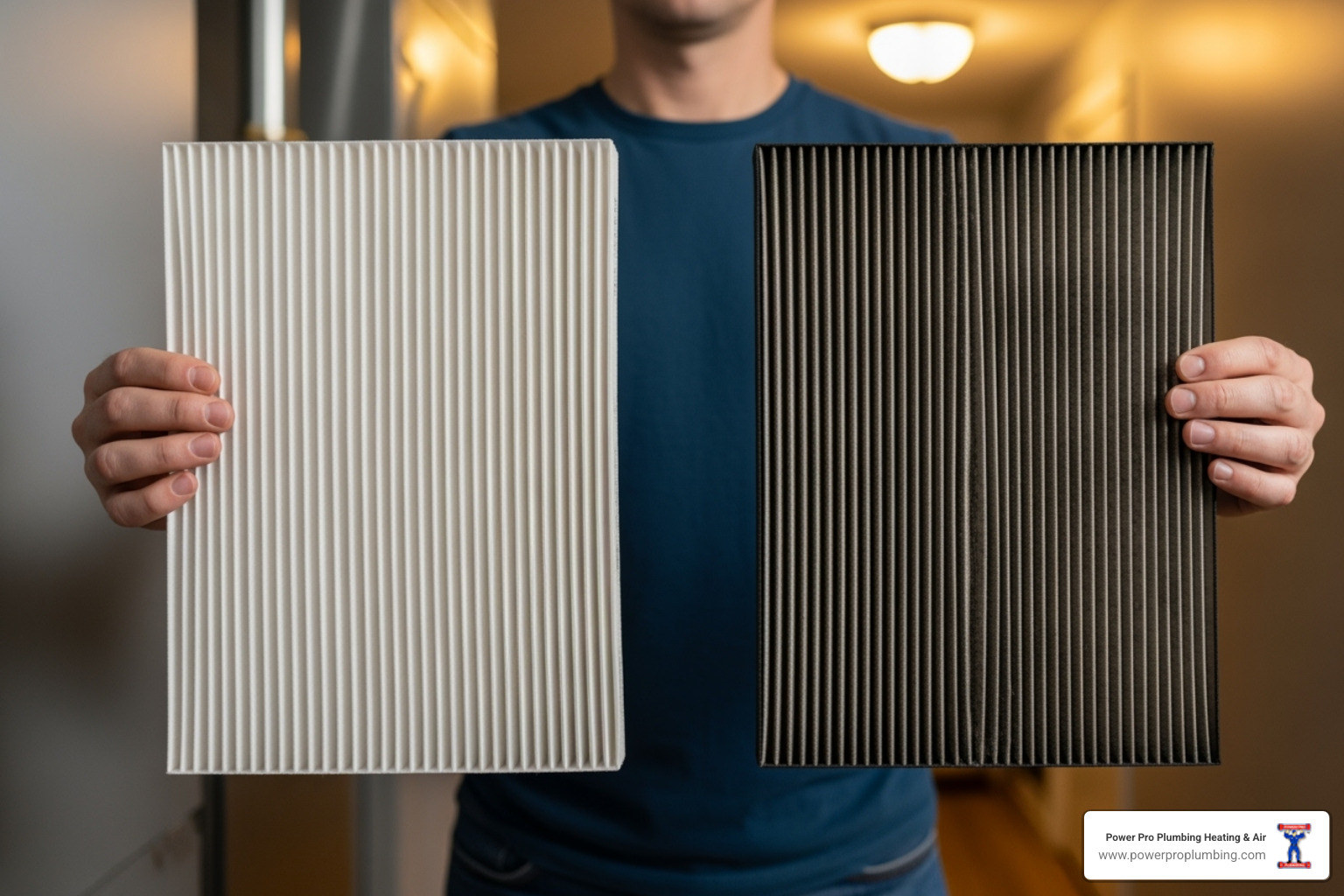
This restricted airflow prevents the evaporator coils from getting enough air, which can cause them to freeze. The system works harder, may overheat, and protective mechanisms can shut down the cooling process, leaving you with warm air.
Here's how to check and change your air filter:
- Find it: The filter is usually near your indoor air handler (in a closet, attic, or behind a return air vent).
- Inspect it: Pull the filter out. If you can't see light through it, it's time for a replacement.
- Replace it: Note the dimensions and MERV rating on the old filter's frame and get a matching one. Slide the new filter in with the arrow pointing toward the air handler.
In Los Angeles, filters should be changed every 1-3 months—more often if you have pets. This simple task prevents many AC problems.
Checking the Power Supply
Sometimes, an AC blowing hot air is just a power issue. If the outdoor unit loses electricity while the indoor fan runs, the air from your vents won't be cooled.
Check your home's electrical panel for a tripped breaker labeled "AC," "HVAC," or similar. To reset it, push the switch firmly to "off" before flipping it back to "on."
Also, check the disconnect switch, a small box usually mounted on the wall near your outdoor unit. Ensure its lever or pull-out block is in the "on" position.
Sometimes a breaker just needs to be flipped back on, but if it happens repeatedly, you should have a repair technician take a look to rule out electrical problems. Frequent tripping signals a more serious issue that needs professional attention.
Why Your AC is Blowing Hot Air: Deeper System Issues
If you've checked the thermostat, filter, and power, but your AC blowing hot air problem continues, it's likely a more complex system issue. These problems involve critical components and typically require professional diagnosis and repair.
When an AC blowing hot air points to a refrigerant leak
Refrigerant is the chemical that allows your AC to cool your home by absorbing heat from inside and releasing it outside. Without enough refrigerant, your system cannot cool the air.
A leak causes cooling capacity to drop, making your AC run constantly without reaching the set temperature. Your energy bills may climb as the system works overtime to compensate.
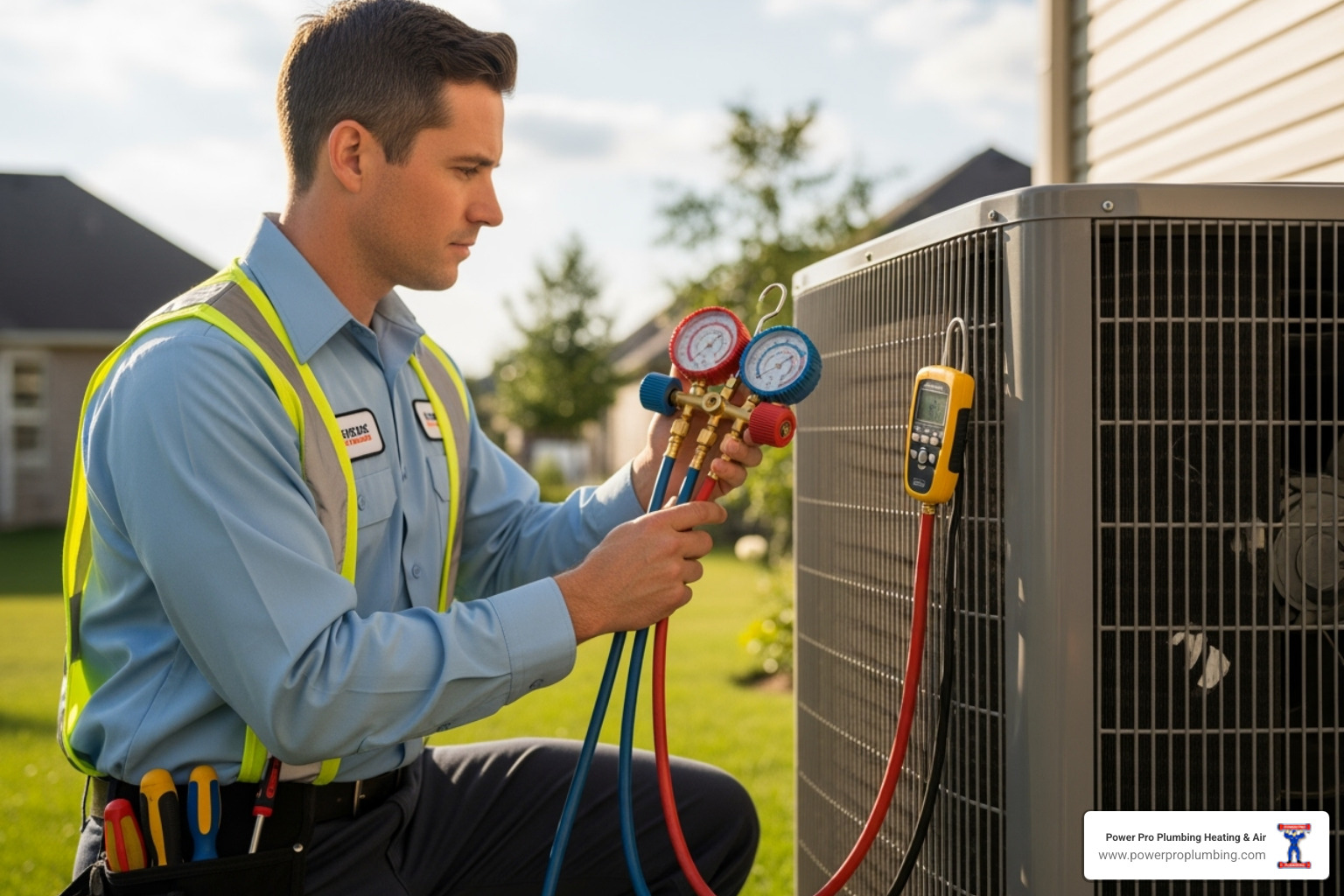
Signs of a leak include hissing or bubbling sounds from your AC units or ice forming on the refrigerant lines. This ice forms because low refrigerant levels cause the remaining chemical to become too cold, freezing ambient moisture.
AC Freon leaks can be dangerous, with exposure potentially leading to coughing, vomiting, dizziness, headaches, and nausea, according to the Missouri Poison Center. If you suspect a leak, turn off your system and ventilate the area. Handling refrigerant requires certification, so this is not a DIY job. Our technicians can safely find and repair leaks and recharge your system to the correct specifications.
Dirty or Frozen Coils
Your AC has two sets of coils: evaporator coils inside and condenser coils outside. If either set is dirty or frozen, the heat exchange process fails, resulting in an AC blowing hot air.
The indoor evaporator coils absorb heat from your air. When airflow is restricted (often by a dirty filter) or refrigerant is low, these coils can get too cold and freeze solid.
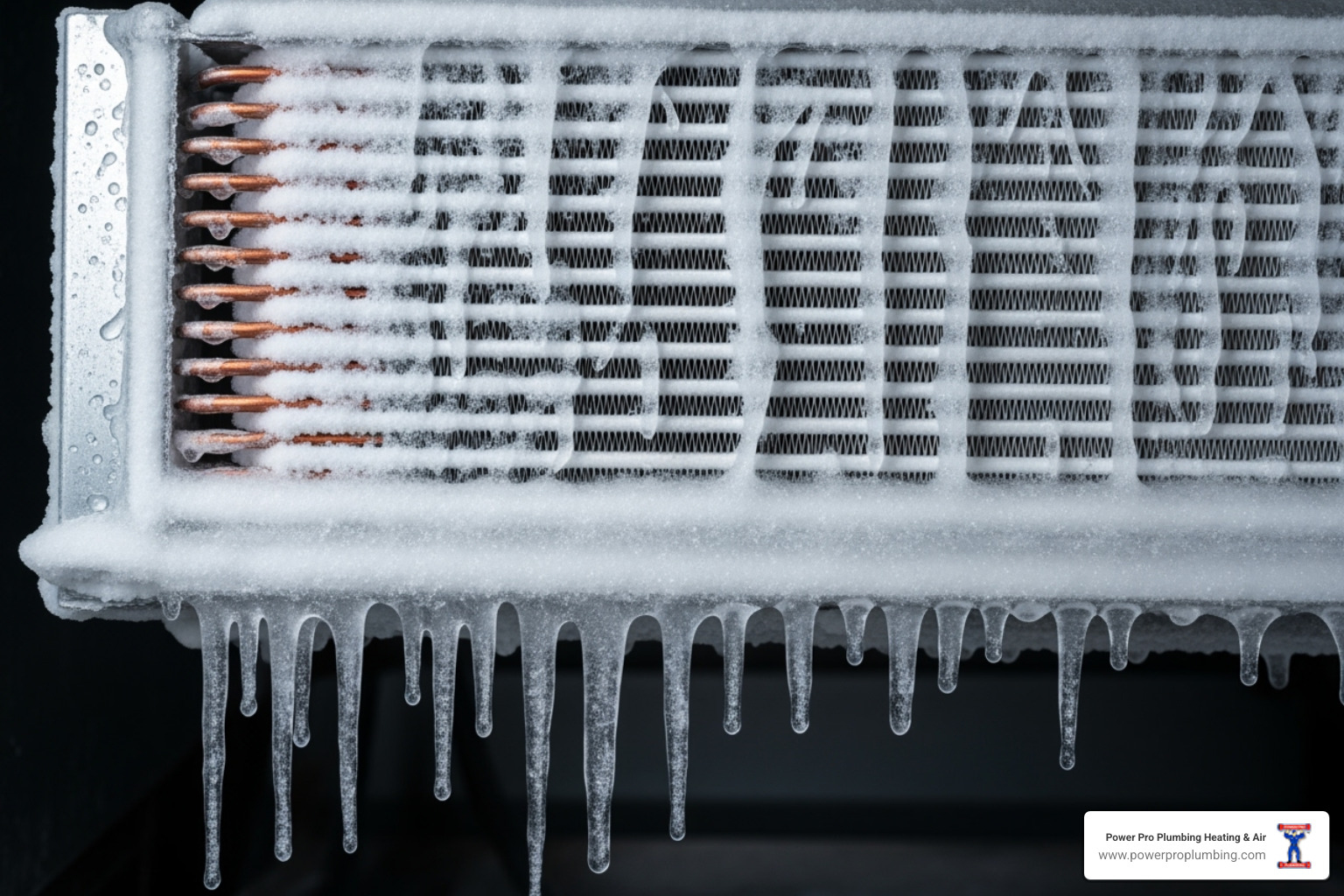
Ice on the coils acts as an insulator, stopping them from absorbing heat. If you see ice, turn off your AC to let it thaw, which can take several hours. However, frozen coils always signal an underlying problem, like a refrigerant leak or blower issue, that needs a professional.
Outside, the condenser coils release collected heat. They can get coated in dirt, leaves, and debris, which prevents them from releasing heat efficiently. This forces your system to work harder and cool less effectively. Professional cleaning during a maintenance visit removes this buildup and restores performance.
The Compressor and Condenser Fan
The compressor is the heart of your AC system, circulating refrigerant. If it fails, the entire system stops cooling. Warning signs of a failing compressor include loud banging or clanking noises, hard starting, or the outdoor unit frequently tripping the circuit breaker.
Working with the compressor is the condenser fan motor, which pulls air across the outdoor coils to release heat. If this fan motor fails or the blade is obstructed, heat gets trapped in the system, and the refrigerant can no longer cool your home's air.
You can visually inspect your outdoor unit: check if the fan is spinning when the AC is on and look for obstructions or unusual noises. These details help our technicians diagnose the issue faster.
Leaky Air Ducts
Your ductwork delivers cool air throughout your home. If it has holes or disconnected sections, a large portion of that cool air escapes into your attic, crawl space, or walls.
This means cool air is lost while warm, unconditioned air is pulled into your duct system, mixing with the conditioned air. The result can be an AC blowing hot air in some rooms, creating uneven temperatures.
Leaking ducts can cause you to lose roughly 20 to 30 percent of conditioned air, resulting in insufficient cooling and high energy costs. This means your AC runs longer and works harder, increasing your energy bills. Signs of leaky ducts include uneven room temperatures, high energy bills, and excessive dust. Our technicians can inspect and seal your ductwork to ensure your system runs efficiently.
The Importance of Prevention and Action
When your AC blowing hot air, it's tempting to ignore it, but this can lead to much bigger problems and bills. Quick action and preventive maintenance are essential for keeping your home comfortable and your system healthy.
Consequences of Ignoring the Problem
Continuing to run a malfunctioning AC can lead to severe consequences:
- Component Damage: A simple issue like a clogged filter forces other parts, like the compressor, to overwork. This extra strain causes premature wear and turns minor fixes into major repairs.
- Compressor Failure: The compressor is a critical component. Constant strain can cause it to overheat and burn out, leading to a costly failure.
- Increased Energy Consumption: A struggling AC runs longer and harder, using more electricity to achieve less cooling. This means higher utility bills for less comfort.
- Poor Indoor Air Quality: Malfunctioning ACs can harbor dirty coils, excess moisture, and mold, degrading the air you breathe and affecting family members with allergies or respiratory issues.
- Complete System Breakdown: Ignoring problems allows them to escalate, potentially leading to a total system failure, often during the worst of a Los Angeles heat wave.
How Regular Maintenance Prevents Issues
Most AC problems are preventable with regular maintenance. An annual tune-up is like a check-up for your cooling system, catching small issues before they become big headaches.
During a tune-up, our technicians hunt for early-stage problems, like low refrigerant, a loose electrical connection, or dirty coils. Fixing these issues early is quick and affordable.
Key benefits of regular maintenance include:
- Improved Efficiency: A clean, well-lubricated system cools your home more effectively while using less energy, lowering your utility bills.
- Longer Lifespan: The average AC unit lasts 12-15 years with proper care. Regular tune-ups help you get the most out of your investment and delay a costly replacement.
- Better Performance: A well-maintained AC runs smoothly and cools your home consistently, even on the hottest days.
- Maintaining Your Warranty: Many manufacturers require proof of annual maintenance to keep your warranty valid. Skipping tune-ups could leave you paying for repairs that should have been covered.
Our Power Pro Club for maintenance is designed to make AC care simple, ensuring your system performs reliably year after year.
Frequently Asked Questions about AC Cooling Problems
When you're dealing with an AC blowing hot air, you likely have questions. Here are the most common ones we hear, with straightforward answers to help you understand what's happening.
Should I turn my AC off if it's blowing hot air?
Yes, absolutely. When your AC blowing hot air, it's a sign that something is wrong. Continuing to run it can make the problem worse.
Leaving a malfunctioning unit on puts tremendous strain on vital components, especially the compressor. This can turn a manageable repair into a complete system failure. Turning the unit off immediately prevents further damage and saves on energy bills, since it's consuming electricity without providing any cooling.
Some AC problems, like electrical faults or refrigerant leaks, can also pose safety risks. Shutting down the system is the safest first step. Once it's off, you can perform the simple checks mentioned earlier or call us for professional help.
When is it better to replace my AC unit instead of repairing it?
This is a tough question, but sometimes replacement is the smarter financial decision. We provide an honest assessment based on these key factors:
- Age of Unit: Most AC systems last 12-15 years. If your unit is in or beyond this range, investing in frequent repairs may not be cost-effective.
- Energy Efficiency (SEER Rating): Modern units have much higher SEER ratings than older models. A new, high-efficiency system can lead to significant savings on your annual energy bills.
- Frequency of Repairs: If you are constantly calling for service, the cumulative cost of repairs might be better invested in a new, reliable system.
- Warranty Status: If your unit is still under warranty, repairs are often the more affordable choice.
- The 50% Rule: A common guideline is to consider replacement if a repair costs 50% or more of the price of a new unit.
Our goal is to help you make the best decision for your home and budget, whether it's a repair or a full replacement.
Can a clogged drain line cause the AC to blow warm air?
A clogged drain line won't directly cause your AC blowing hot air, but it can shut your system down entirely, which means no cool air at all.
As your AC removes humidity, the moisture collects in a condensate pan and drains out through a line. If this line clogs with algae or debris, water backs up in the pan. Most modern systems have a safety float switch that detects this rising water and shuts down the entire AC unit to prevent water damage.
So, while the clog itself doesn't cause warm air, the resulting safety shutdown leaves you without cooling. Your indoor fan might still run, making it feel like the AC is blowing warm air.
This is preventable with simple maintenance. Regularly cleaning your AC drain lines every three months can save you from this frustrating problem and keep your system running smoothly.
Stay Cool: Your Next Steps for a Comfortable Home
When your AC blowing hot air turns your Los Angeles home into a sauna, you have a clear roadmap to a solution.
Start with what you can control. First, walk through the simple checks: verify your thermostat is on "Cool" and "Auto," inspect the air filter for clogs, and check for a tripped circuit breaker. These steps solve many common issues at no cost.
Know when to call for help. If the basics don't work, it's time for professional expertise. Issues like refrigerant leaks, frozen coils, or failing compressors require specialized tools and training to fix safely and effectively. Attempting these repairs yourself can be dangerous and cause more damage.
Prevention is the best strategy. A well-maintained AC that receives annual tune-ups is far less likely to break down. Regular service catches small problems early, improves efficiency, and extends your system's lifespan. Our Power Pro Club makes this essential maintenance simple and worry-free.
With over 28,573 reviews from homeowners throughout the greater Los Angeles area, we've built our reputation on honest, effective service. As a Daikin Comfort Pro, we stand behind our work with strong warranties that protect your investment.
Don't spend another night in the heat. For expert AC repair and maintenance in Beverly Hills and the greater Los Angeles area, contact our team today. We're here to restore your comfort and keep you cool all summer long.

